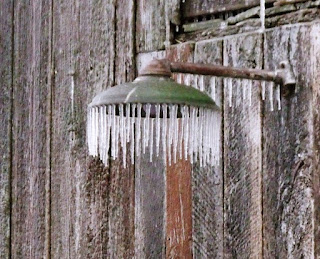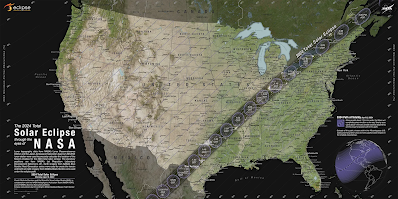Gifts on St. Nicholas Day?
Remember when, in some Catholic circles, handing out gifts on St. Nicholas's feast day was a thing? I don't mean hiding a few candies in the shoes of children (aren't Catholics weird?.. I love it), I speak of full out Christmas presents given on December 6th instead of December 25th. The rationale being that making Christmas so heavily connected to the excitement of opening presents impedes the spiritual celebration of Christ's birth. Never mind the gold, frankincense and myrrh. I present to you several considerations on the matter. Suffice it to say my thesis statement is that Christmas presents should be handed out on, well, Christmas.
On Near Occasions
It is true that gift-giving can diminish the spiritual understanding of Christmas. So too can wine, annoying relatives, lack of sleep, over-cooked turkey and, of course, Mariah Carey Christmas music, assuming that she is not addressing Jesus when she sings that all she wants for Christmas is "you". The point being that gift-giving, like other honoured traditions observed at Yuletide, always has the possibility to produce spiritual harm. Life is full of spiritual risks, even when doing the right task or following one's proper vocation. To join a monastery is to be in a near-occasion for gossiping about Brother Superior. To become a mother is a near-occasion for sleep-deprived anger at a child who eats crayons for a snack. To give bread to the hungry is a near-occasion for prideful selfies, #imahero. Good and wholesome activities, or vocations, can produce spiritual risks.
Does gift-giving in honour of Christ's birthday spoil the spiritual celebration of Christmas? It's possible. If it does, however, I think it is the fault of the person or family. If your child is singing "all I want for Christmas is you" while staring lovingly at his presents, perhaps there is a deeper need than simply dishing out presents on December 6th. Perhaps instead he needs some parental counseling in the matter, grace too, and a good example set by the parents. Then go to Mass on Christmas day, sing the holy carols, lay the baby in the manger while reading the bible and finally, once this message is good and clear, open the presents in thanksgiving and joy for the special day. The special day being Christ's birthday.
On Advent as Penance
To the people who move gift-giving to the feast of St. Nicholas in order to uphold Christmas I ask: What about upholding advent? Advent is a penitential time made with joyful hope (or a hopeful time filled with penance, depending on how you view it). Moving gift-giving to advent is completely against the nature of this holy preparation. Consider the person who does a workout so that he can eat cake later (I know, I know, shameful). What if, in the middle of the workout, the person brought out the double fudge cake and started eating? And then, once the cake crumbs are dusted off the ole Nike dry-fit compression high performance workout shirt, it's back to ab crunches and arm curls? Workouts and double fudge cake don't mix. Neither should advent and Christmas presents. Fasting and feasting should be done in proper order.
On St. Nicholas as Gift-Giver
Gifts are given in honour of Christ's birthday. Thank St. Nicholas' generosity for being the precursor to this tradition. Now there have been past Eastern traditions involving St. Nicholas' day and gifts. But in the Western world let me repeat: gifts are given in honour of Christ's birthday.
On Common Sense
Let me conclude by reiterating that Catholic traditions, though many are quirky and bizarre, follow a spiritual common sense. A water fight on the feast of St. John the Baptist is actually logical. Same too for watching a movie on the feast of St. Clare, or eating a croissant in honour of Our Lady of the Rosary. If a trendy "tradition" arises which causes good honest Catholics to go "huh?" then a violation of common sense might be occurring.
That families seek to maximize the spiritual meaning of Christmas is laudable. Yet this must be done using reasonable methods. Moving present time away from Christmas is to put the cart before the horse. Rather than move the gift-giving, work on instilling gift-giving as adding to the joyful celebration of the birth of Christ. Perhaps fewer gifts can be given if necessary. Or gifts can also be given for the less fortunate. But for heaven's sake, don't mix up feast days! Keep Christmas, and all of its traditions and gift-giving, as the ultimate end of advent. More importantly, teach your children why you do these traditions. To quote the apostle of common sense, GK Chesterton:
 |
| Photo credit: Common Sense Media |
It is true that gift-giving can diminish the spiritual understanding of Christmas. So too can wine, annoying relatives, lack of sleep, over-cooked turkey and, of course, Mariah Carey Christmas music, assuming that she is not addressing Jesus when she sings that all she wants for Christmas is "you". The point being that gift-giving, like other honoured traditions observed at Yuletide, always has the possibility to produce spiritual harm. Life is full of spiritual risks, even when doing the right task or following one's proper vocation. To join a monastery is to be in a near-occasion for gossiping about Brother Superior. To become a mother is a near-occasion for sleep-deprived anger at a child who eats crayons for a snack. To give bread to the hungry is a near-occasion for prideful selfies, #imahero. Good and wholesome activities, or vocations, can produce spiritual risks.
Does gift-giving in honour of Christ's birthday spoil the spiritual celebration of Christmas? It's possible. If it does, however, I think it is the fault of the person or family. If your child is singing "all I want for Christmas is you" while staring lovingly at his presents, perhaps there is a deeper need than simply dishing out presents on December 6th. Perhaps instead he needs some parental counseling in the matter, grace too, and a good example set by the parents. Then go to Mass on Christmas day, sing the holy carols, lay the baby in the manger while reading the bible and finally, once this message is good and clear, open the presents in thanksgiving and joy for the special day. The special day being Christ's birthday.
On Advent as Penance
To the people who move gift-giving to the feast of St. Nicholas in order to uphold Christmas I ask: What about upholding advent? Advent is a penitential time made with joyful hope (or a hopeful time filled with penance, depending on how you view it). Moving gift-giving to advent is completely against the nature of this holy preparation. Consider the person who does a workout so that he can eat cake later (I know, I know, shameful). What if, in the middle of the workout, the person brought out the double fudge cake and started eating? And then, once the cake crumbs are dusted off the ole Nike dry-fit compression high performance workout shirt, it's back to ab crunches and arm curls? Workouts and double fudge cake don't mix. Neither should advent and Christmas presents. Fasting and feasting should be done in proper order.
On St. Nicholas as Gift-Giver
Gifts are given in honour of Christ's birthday. Thank St. Nicholas' generosity for being the precursor to this tradition. Now there have been past Eastern traditions involving St. Nicholas' day and gifts. But in the Western world let me repeat: gifts are given in honour of Christ's birthday.
On Common Sense
Let me conclude by reiterating that Catholic traditions, though many are quirky and bizarre, follow a spiritual common sense. A water fight on the feast of St. John the Baptist is actually logical. Same too for watching a movie on the feast of St. Clare, or eating a croissant in honour of Our Lady of the Rosary. If a trendy "tradition" arises which causes good honest Catholics to go "huh?" then a violation of common sense might be occurring.
That families seek to maximize the spiritual meaning of Christmas is laudable. Yet this must be done using reasonable methods. Moving present time away from Christmas is to put the cart before the horse. Rather than move the gift-giving, work on instilling gift-giving as adding to the joyful celebration of the birth of Christ. Perhaps fewer gifts can be given if necessary. Or gifts can also be given for the less fortunate. But for heaven's sake, don't mix up feast days! Keep Christmas, and all of its traditions and gift-giving, as the ultimate end of advent. More importantly, teach your children why you do these traditions. To quote the apostle of common sense, GK Chesterton:
“The great majority of people will go on observing forms that cannot be explained; they will keep Christmas Day with Christmas gifts and Christmas benedictions; they will continue to do it; and some day suddenly wake up and discover why.”
– 'On Christmas,' Generally Speaking






Comments
Post a Comment